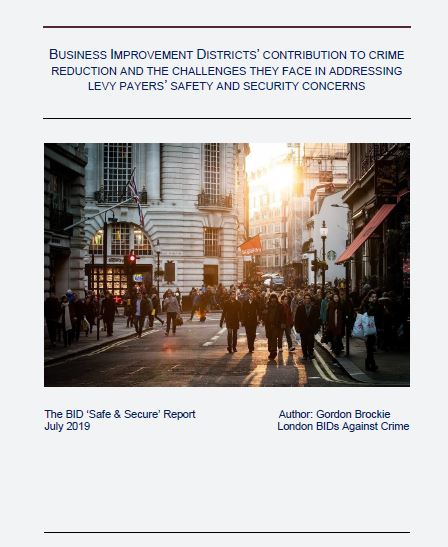Research: London’s BIDs are vital contributors to reducing low-level crime

New research released by London BIDs Against Crime (LBAC) assesses the contribution of London’s Business Improvement Districts to crime-reduction across the capital, and identifies the challenges they face in addressing levy payers’ safety and security concerns.
Here are some of the key findings of the report:
- BID consultation feedback gathered from business communities across the capital clearly demonstrates that ‘safe and secure’ issues consistently rate amongst the top concerns for levy payers.
- Not only do the majority of BIDs have the solid foundations of a Business Crime Reduction Partnership embedded into their ‘safe and secure’ models, the overall benefits they deliver far exceed traditional town centre approaches to crime reduction.
- London BIDs are a valuable partner in raising counter terrorism awareness across the capital’s business communities due to their outreach and high levels of business engagement.
- Government cuts, a reduction in policing numbers, an upsurge in violent crime and changing policing priorities are all factors that leave BID operating areas and the very heart of our town centre communities vulnerable to crime, antisocial behavior and a downturn in economic prosperity.
- Against the backdrop of their own austerity measures and equally affected by policing cuts; national retailers are increasingly looking for a greater return on their levy fees through additional levels of BID security investment.
Highlighting the substantial impact BIDs have on preventing and detecting business crime and antisocial behaviour in the communities they serve, the report also critically examines the roles of partnerships across the private and public sector and makes achievable recommendations on how key partners and all stakeholders involved in crime reduction can collaborate to make BIDs safer places to work, visit and invest in, these include:
- BIDs should clearly document their financial ‘safe and secure’ commitment within their business plan as well as defining what crime reduction measures are being delivered on their website.
- BIDs should consider introducing a more uniformed approach to their crime reduction schemes by adopting the nationally recognised BCRP framework into their ‘safe and secure’ models or out-sourcing their BCRP to a specialist third party.
- National retailers are encouraged to introduce head office policies to support BID security initiatives in their local stores, covering direct participation in these schemes, the use of local town-link radios and active participation in BIDs’ Disc systems.
- NBCC and Met Police should define standard operating procedures to ensure a consistent quality of service is delivered to businesses and the public in town centres – this message must be communicated effectively to on-the-ground BID-funded police officers and officers with town-centre beats.
- MOPAC should issue guidance of best practice on how local authority community safety teams can work in partnership with BIDs to meet their shared objectives.
- The Home Office should increase its funding and commitment to the NBCC to benefit all stakeholders involved in business crime-reduction locally, force-wide and nationally.
Report author, Gordon Brockie says
“In addition to the positive findings and survey results, I was impressed to discover that many BIDs were taking a more holistic approach to tackling business crime by acknowledging how societal issues such as knife crime, hate crime, violence against women and offences against the vulnerable impact their own business communities. I was also surprised by the quality of business resilience support being delivered in central and inner London BIDs.
“I’m pleased to see some of the recommendations of the report are already taking shape and that more integrated ties have been established between London BIDs and the Metropolitan Police, Mayor’s Office for Policing and Crime and London Councils. Although significant progress is being made, it’s anticipated that questions around statutory levels of responsibility will still remain an interesting area of debate.”